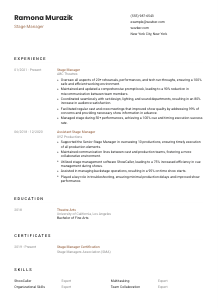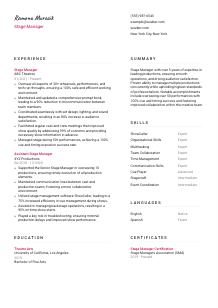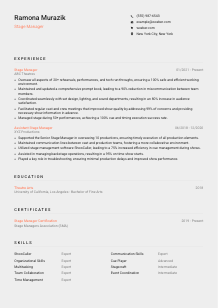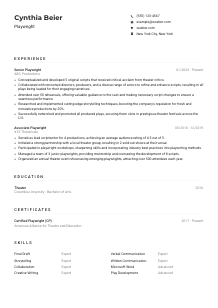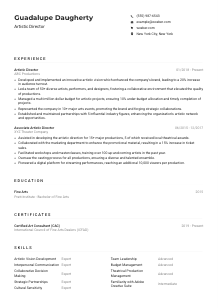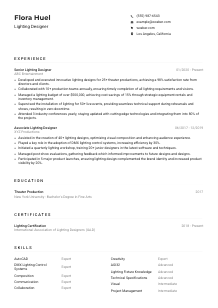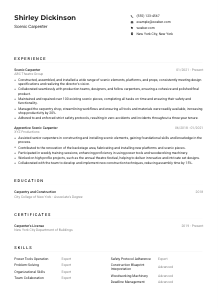Stage Manager Resume Example
Calling all curtain raisers! Coordinate your talents with this Stage Manager resume example, choreographed using Wozber free resume builder. Discover how effortlessly you can cue your stage savvy to align with job spotlights, ensuring your career takes center stage, not the occasional tumble!
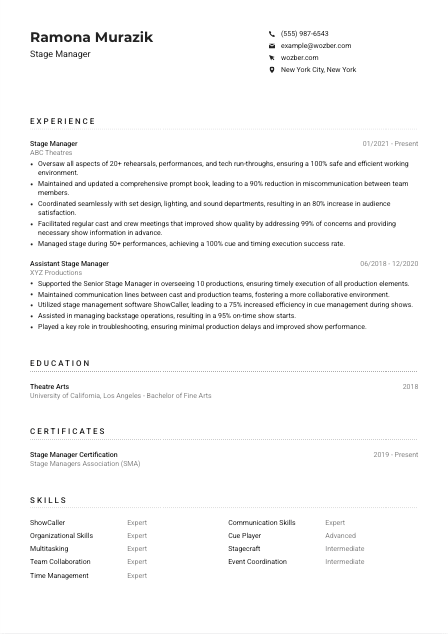
How to write a Stage Manager resume?
Hello, aspiring Stage Manager! In the vibrant world of theatre and performing arts, capturing the spotlight begins well before the curtain rises—it starts with your resume. With the right blend of creativity, precision, and a dash of stage magic, your resume can transform from a simple document into a compelling narrative of your career.
Leveraging Wozber's free resume builder, this guide is your backstage pass to a resume that not only meets industry standards but also dances perfectly in tune with the rhythm of Applicant Tracking Systems (ATS). Let's raise the curtain on this exciting journey to craft a resume that deserves a standing ovation!
Personal Details
Like the opening scene of a great play, the Personal Details section sets the stage for what's to come. This is where you make your first impression, so every detail counts.
1. Spotlight Your Name
Think of your name as the marquee of your resume—theatre. Make sure it shines bright by using a font that's clear and commands attention, setting the stage for your application.
2. Embrace Your Role
Right beneath your name, spotlight the role you're auditioning for - in this case, "Stage Manager." This targeted approach immediately aligns your resume with the job description and sets the tone for your application.
3. Essential Contact Cues
Give the director (a.k.a. hiring manager) the means to contact you for an audition. Include a phone number and a professional email (think firstname.lastname@mail.com) to keep the communication channels open and professional.
4. Set the Stage
The job emphasized being located in "New York City, New York." Highlight this in your resume to confirm your local availability or willingness to embrace the city's vibrant culture. An accurate location can be the deciding factor for your casting in this role.
5. Digital Stage Presence
A LinkedIn profile or a personal website can be like your online portfolio—showcasing past performances, reviews, and scripts you've managed. If it's polished and professional, include it to provide a 360-view of your talents.
Takeaway
Your Personal Details section is your opening number. Make it memorable, accurate, and tailored to the role of Stage Manager. Think of it as your professional headshot: it should catch the director's eye and make them want to see more.





Experience
The Experience section is your chance to show the audience (the hiring manager) the range of your performances (roles) and how you've captivated audiences (achieved success) in previous productions (jobs).
- Oversaw all aspects of 20+ rehearsals, performances, and tech run‑throughs, ensuring a 100% safe and efficient working environment.
- Maintained and updated a comprehensive prompt book, leading to a 90% reduction in miscommunication between team members.
- Coordinated seamlessly with set design, lighting, and sound departments, resulting in an 80% increase in audience satisfaction.
- Facilitated regular cast and crew meetings that improved show quality by addressing 99% of concerns and providing necessary show information in advance.
- Managed stage during 50+ performances, achieving a 100% cue and timing execution success rate.
- Supported the Senior Stage Manager in overseeing 10 productions, ensuring timely execution of all production elements.
- Maintained communication lines between cast and production teams, fostering a more collaborative environment.
- Utilized stage management software ShowCaller, leading to a 75% increased efficiency in cue management during shows.
- Assisted in managing backstage operations, resulting in a 95% on‑time show starts.
- Played a key role in troubleshooting, ensuring minimal production delays and improved show performance.
1. Analyze the Script
Start by dissecting the job description like a complex script. Highlight the elements that resonate with your past roles, and prepare to bring them to life in your resume.
2. Setting the Scenes
List your experiences in reverse-chronological order, leading with your most recent role. Ensure the title of "Stage Manager" and relevant companies are prominently featured, providing a clear timeline of your career's story arc.
3. Your Performance Highlights
For each role, curate achievement statements that reflect your accomplishments. Align them with the job's key requirements, such as overseeing rehearsals or managing stage cues, to demonstrate your expertise and value.
4. Commanding Numbers
Bring your accomplishments to life with quantifiable metrics. 'Managed 50+ performances' or 'Increased audience satisfaction by 80%' provide tangible evidence of your impact and efficiency.
5. Scene Relevance
While a diverse experience is valuable, stay focused on the relevancies to Stage Management. Let other less pertinent roles play a supporting act, allowing your star performances to take center stage.
Takeaway
An ATS-optimized Experience section with Wozber is your spotlight moment. Showcase your talents, accomplishments, and the unique value you bring to the role. Remember, in the theatre of your career, every role you've played contributes to the story you're telling now.
Education
Your Education section is more than just a list of schools—it's evidence of your foundation in the craft of Stage Management. Here's how to make it resonate with directors looking for top talent.
1. The Lead Role
Start by highlighting the starring requirement from the job description: a "Bachelor's degree in Theatre, Performing Arts Management, or related field." Ensure your degree aligns with this specification to set you ahead in the casting.
2. The Setting
Your education should be presented clearly and concisely, in an easy-to-scan format. Include your field of study, the degree earned, the institution's name, and the graduation date.
3. The Script Alignment
If your degree is an exact match for the job requirements (like a Bachelor of Fine Arts in Theatre Arts), ensure it's highlighted prominently. This not only meets the criteria but also showcases your dedicated preparation for a career in Stage Management.
4. Special Features
If applicable, highlight relevant courses, workshops, or extracurriculars that further demonstrate your commitment and expertise in theatre and stage management. This additional training can set the scene for your capabilities.
5. Supporting Roles
Other noteworthy academic achievements, like honors or relevant project work, can support your leading qualifications. However, keep the focus on what's most relevant to Stage Management to maintain the spotlight on your primary strengths.
Takeaway
Your Education section lays the foundation of your journey into Stage Management. Craft it to highlight your relevant training and academic milestones, illustrating your readiness and qualifications for the role. Let it set the stage for your professional narrative.
Certificates
Certificates are like rave reviews—they catch the eye and underscore your commitment to your craft. While not always a marquee requirement, they can significantly boost your resume's standing ovation factor.
1. Identify the Spotlight
Review the job posting for any mentioned certifications. While our Stage Manager example didn't explicitly require them, showcasing relevant certs, like a Stage Manager Certification, can signal your dedication to professional growth.
2. Choose Relevant Acts
Prioritize certificates closely aligned with Stage Management. This focus supports your application by highlighting your specialized competencies and ongoing learning efforts.
3. Scene Timings
List your certifications with their respective dates, especially if they are recent or require recertification. It shows that you're up-to-date with current industry standards and practices.
4. Continuous Improvisation
The theatre world evolves, and so should your skill set. Stay engaged with professional development opportunities, accumulating certificates that enhance your Stage Management capabilities.
Takeaway
Consider your certifications as the reviews and testimonials of your career. They enhance your credibility, showcase ongoing learning, and can set you apart in the casting call for a Stage Manager. Spotlight them wisely for maximum impact.
Skills
Your skills section is like the technical rehearsal for your resume. It's where you align your professional toolkit to the stage's demands, ensuring that when the lights go up, you're ready to perform.
1. Script Analysis
Dive into the job description to identify both the explicitly stated and implicitly required skills. From proficiency in stage management software "ShowCaller" to leadership capabilities, each skill lights a path to your successful application.
2. Cast the Right Roles
Focus on listing skills that resonate directly with the job description. Whether it's organizing skills or the ability to manage multiple productions, ensure each skill you include serves the narrative of you as the ideal Stage Manager.
3. Stage Directions
Arrange your skills in a manner that's both logical and impactful. Lead with your strongest, most relevant skills to capture attention swiftly, akin to a striking opening scene that grabs the audience.
Takeaway
The Skills section of your resume is your chance to shine a spotlight on your professional abilities. By carefully selecting and arranging skills that align with the Stage Manager role, you're choreographing your resume to perform flawlessly under the scrutiny of ATS and hiring managers alike.
Languages
In the global theatre of performing arts, language skills can open doors and create profound connections. While often a supporting act, your ability to communicate in multiple languages can make your resume stand out in a crowded casting room.
1. Review the Script
The job description mentioned, "Ability to speak, read, and write in English is necessary." This is your cue to ensure your English proficiency is front and center, marked as 'Native' or as high as applicable.
2. Highlight Your Range
Showcase additional languages you're fluent in, like Spanish, as our example did. This can signify your ability to work with diverse teams and audiences, heightening your appeal in the eyes of a creative director.
3. Rank Your Versatility
Rank your languages from most to least proficient, providing a clear picture of your linguistic capabilities. From 'Native' proficiency to 'Basic' understanding, each language is another script you're prepared to read.
4. Honesty in Your Act
Be accurate in your self-assessment. Overstating your language abilities can lead to awkward situations, much like an ill-prepared improv act. Honesty fosters trust and sets the stage for long-term success.
5. The Global Audience
For roles, like Stage Manager, involving diverse casts and crews or international tours, emphasizing your multilingual skills can be a unique selling point, showcasing your readiness for the global stage.
Takeaway
Linguistic skills can amplify your resume, reflecting a global mindset and versatility. Whether it's a starring or supporting role in your application, let your linguistic abilities speak volumes about your potential to connect and perform on the world's stages.
Summary
Like a captivating opening scene that sets the tone for a play, your summary introduces you to the hiring manager. It's your chance to shine, to captivate, and to ensure the audience is eager for more.
1. The Essence of Your Role
Absorb the essence of the Stage Manager position from the job description. Begin your summary with a strong, engaging statement that encapsulates your professional identity and highlights your dedication to the art of stage management.
2. Showcase Your Talents
Articulate your key skills and notable achievements, such as managing 50+ performances with a "100% cue and timing execution success rate," painting a vivid picture of your capabilities and successes.
3. Scene Precision
Your summary should be a concise overture to your application, offering just enough intrigue to compel the hiring manager to delve deeper into your resume. Aim for clarity and impact, keeping your summary to a few powerful lines.
4. Curtain Call
End your summary with a subtle call to action, inviting the reader to explore the scenes (sections) that follow. Position yourself as the undeniable choice for the role, ready to take center stage and lead their productions to success.
Takeaway
Your summary is the spotlight moment before the curtain rises on the rest of your resume. Make it compelling, clear, and reflective of your unique value as a Stage Manager. Lead with confidence, setting the stage for a performance that no hiring manager will want to miss.
Launching Your Stage Manager Journey
With every line and cue finely tuned, your Stage Manager resume is ready to command the spotlight. Remember, crafting a resume is like putting on a production: it requires attention to detail, understanding of the audience (hiring manager), and a touch of creativity. Using Wozber's free resume builder, including the ATS-friendly resume template and ATS optimization tools like the ATS resume scanner, you're equipped to create a performance that lands you the role of a lifetime. Break a leg!

- Bachelor's degree in Theatre, Performing Arts Management, or related field.
- Minimum of 3 years of professional stage management experience.
- Proficiency in stage management software such as ShowCaller or Cue Player.
- Strong organizational and multitasking skills, with the ability to manage multiple productions simultaneously.
- Effective communication and leadership skills, with an emphasis on collaboration within a creative team.
- Ability to speak, read, and write in English is necessary.
- Must be located in New York City, New York.
- Oversee all aspects of rehearsals, performances, and tech run-throughs, ensuring a safe and efficient working environment.
- Maintain prompt book and communicate changes to the production team and cast.
- Coordinate with various departments such as set design, lighting, and sound to ensure seamless productions.
- Facilitate regular cast and crew meetings to address any issues or concerns, and provide necessary information for the show's success.
- Manage the stage during performances, ensuring all cues and timing are executed correctly.





